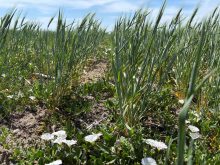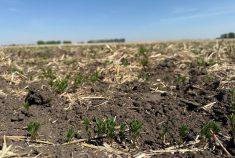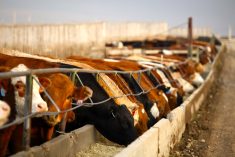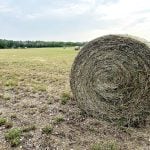CNS Canada –– Livestock producers in Western Canada will likely have to import feed grains such as corn and dried distillers grains with solubles (DDGS) this year, as drought is seen trimming domestic barley and other feed production.
“We’ve seen droughts before, and when it’s happened, usually what has to happen is we import other feed grains from outside of Canada,” said Jim Beusekom, a grain trader with Market Place Commodities in Lethbridge.
“If this (drought) continues like this, it’s not a matter of price, it’s a matter of supply — we’re going to have to import U.S. corn and DDGS into Western Canada to cover the feed supplies.”
Read Also

U.S. livestock: Feeder cattle hit contract highs on tight supply
Chicago | Reuters – All Chicago Mercantile Exchange feeder cattle futures and most live cattle futures hit contract highs on…
Normally June is a rainy month for Western Canada, but it hasn’t been in many regions this year, Beusekom said. While not all crops are in dire straits, as some parts of Saskatchewan and Manitoba have enough moisture, drought is still a major issue.
“Right now I believe it’s 50 per cent to two-thirds of the Prairies are experiencing drought, with at least a third of it extreme, maybe half is extreme right now.”
Lack of moisture is already affecting the feed supply in parts of Western Canada, as forages suffer and hay prices are on the rise.
While the drought overall is having a negative impact on crop production and supply availability, Beusekom noted it could be worse.
“The feed market is substantially smaller than it was the last time we had a drought. There are less cattle on feed, less hogs on feed, and that makes a difference.
“Yeah, drought is still a big problem, but I believe the last major drought we had it was a bigger problem. We had to rely heavier on U.S. imports.”
Worries about tight supplies are also pushing prices higher, which means farmers will likely get a good return for what they are able to produce this year.
Feed barley prices are currently quoted at $225 per tonne in Lethbridge, Canada’s feed alley, up from $202 per tonne a month ago, according to data compiled by the Alberta Canola Producers Commission.
While prices could still move higher on a local level if someone insists on buying barley, general pricing for the commodity will likely only move up significantly if outside markets strengthen.
“We would have to see a move higher in corn, wheat, soybeans for prices to go up significantly higher,” Beusekom said. “It becomes looking at the U.S. conditions again, seeing what crop conditions are like down there — that should determine the price for fall and winter.”
— Terryn Shiells writes for Commodity News Service Canada, a Winnipeg company specializing in grain and commodity market reporting.
















